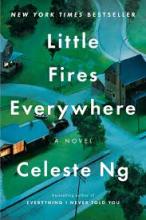 Shaker Heights is the kind of community where garbage is stored always out of sight from the street, and every last detailed is planned, from the diversity of its population to the color scheme of each house. When a free-spirited artist, Mia, and her daughter Pearl move to town, their lives become entangled with the members of the Richardson family, each of whom are either enamored with or infuriated by Mia and Pearl’s nonconformity. After a public scandal arises surrounding the custody of an abandoned baby, everyone in town is obliged to take sides in a controversy that will put ambiguous ethics at odds with family loyalties.
Shaker Heights is the kind of community where garbage is stored always out of sight from the street, and every last detailed is planned, from the diversity of its population to the color scheme of each house. When a free-spirited artist, Mia, and her daughter Pearl move to town, their lives become entangled with the members of the Richardson family, each of whom are either enamored with or infuriated by Mia and Pearl’s nonconformity. After a public scandal arises surrounding the custody of an abandoned baby, everyone in town is obliged to take sides in a controversy that will put ambiguous ethics at odds with family loyalties.
The novel has a nostalgic feel from the pre-Internet late 90s, when there was still some mystery in the lives of teenagers, and digging into other people’s past required some old-school sleuthing. Celeste Ng deftly weaves through different time periods and perspectives, as each of the characters confronts the weight of their past decisions and struggles to move forward without casting judgment on themselves and others.
Set in a suburb founded on the idealism of planned order, the story peels back the façade of a community free from discrimination, conflict, and uncertainty. Messy emotions are unearthed. Fires, real and figurative, are ignited. Ng takes readers on a journey through uncomfortable gray areas with no clear way out.
“You’ll always be sad about this,” Mia said softly. “But it doesn’t mean you made the wrong choice. It’s just something that you have to carry.”

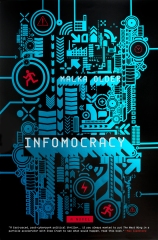 An author and humanitarian worker, Malka Older’s novel Infomocracy comes at a pertinent time– when illegitimate information is being weaponized, and accuracy and transparency of data feels increasingly fragile. In Older’s utopian world of Infomocracy, Information with a capital “I” is glorified in a new world order. Here, groups of 100,000 people elect their own government, and things like the nation-state, guns, and war are obsolete.
An author and humanitarian worker, Malka Older’s novel Infomocracy comes at a pertinent time– when illegitimate information is being weaponized, and accuracy and transparency of data feels increasingly fragile. In Older’s utopian world of Infomocracy, Information with a capital “I” is glorified in a new world order. Here, groups of 100,000 people elect their own government, and things like the nation-state, guns, and war are obsolete.
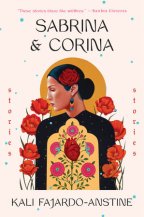 In this debut collection of stories, Fajardo-Anstine weaves together an exquisite tapestry of Indigenous Chicana women. Set in modern Denver as gentrification morphs the landscape into something unrecognizable, the characters navigate an unrelenting world through sheer determination and lack of any other alternative. These are stories about displacement and female relationships—about physical realities that are easily and carelessly destroyed, as well as the deep roots that persist through generations.
In this debut collection of stories, Fajardo-Anstine weaves together an exquisite tapestry of Indigenous Chicana women. Set in modern Denver as gentrification morphs the landscape into something unrecognizable, the characters navigate an unrelenting world through sheer determination and lack of any other alternative. These are stories about displacement and female relationships—about physical realities that are easily and carelessly destroyed, as well as the deep roots that persist through generations.
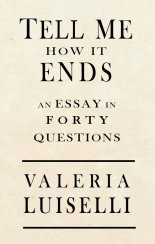 An essay in 40 questions, beginning with “Why did you come to the US? Where are your parents?”
An essay in 40 questions, beginning with “Why did you come to the US? Where are your parents?”
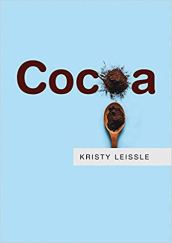 How did cocoa go from being a highly masculinized beverage for Mesoamerican warriors, to a status symbol for European sociopolitical elite, to its current position as a highly accessible global luxury? How is it magically transformed from an alien-like tropical tree fruit to the glossy little packages on grocery store shelves? What does it mean to be an ethical consumer of chocolate?
How did cocoa go from being a highly masculinized beverage for Mesoamerican warriors, to a status symbol for European sociopolitical elite, to its current position as a highly accessible global luxury? How is it magically transformed from an alien-like tropical tree fruit to the glossy little packages on grocery store shelves? What does it mean to be an ethical consumer of chocolate?
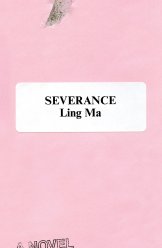 Candace is an aspiring photographer who thrives on the routine of her young professional life in New York City. She navigates the city in contented anonymity and plays her part as a competent and vital cog in the mass production of Bibles for publishing clients. As an epidemic of Shen Fever threatens the global population, Candace clings to the comforts of her 9 to 5 job, while the rest of the city flees to hometowns to find family and refuge. An orphaned daughter of immigrants, Candace is on her own until she joins up with a group of survivors led by Bob—an IT guy on a power trip, looking to enact his own vision for a new society.
Candace is an aspiring photographer who thrives on the routine of her young professional life in New York City. She navigates the city in contented anonymity and plays her part as a competent and vital cog in the mass production of Bibles for publishing clients. As an epidemic of Shen Fever threatens the global population, Candace clings to the comforts of her 9 to 5 job, while the rest of the city flees to hometowns to find family and refuge. An orphaned daughter of immigrants, Candace is on her own until she joins up with a group of survivors led by Bob—an IT guy on a power trip, looking to enact his own vision for a new society.
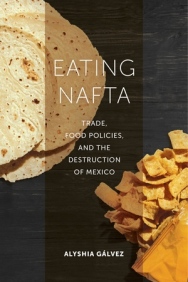 Originally published on Latinobookreview.com
Originally published on Latinobookreview.com
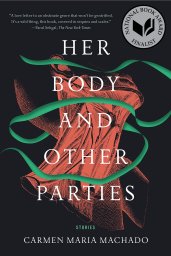 One thing I love about essay and story collections is seeing the recurring images and ideas that pop up throughout, like the weeds (or wild flowers?) of the author’s subconscious. As the title suggests, Her Body and Other Parties by Carmen Maria Machado is full of women’s bodies—bodies disappearing, falling apart, taking up space. With hints of surrealism, Machado’s stories explore the ways that we are continually haunted by past traumas. She renders the neurotic mania that sometimes takes the wheel when women remain unheard or misunderstood as well as the pain of feeling like a burden to your loved ones. Her characters don’t necessarily find healing and happy endings, but I love that they face their truest selves, no matter how terrifying it is, and fiercely pursue what they most desire.
One thing I love about essay and story collections is seeing the recurring images and ideas that pop up throughout, like the weeds (or wild flowers?) of the author’s subconscious. As the title suggests, Her Body and Other Parties by Carmen Maria Machado is full of women’s bodies—bodies disappearing, falling apart, taking up space. With hints of surrealism, Machado’s stories explore the ways that we are continually haunted by past traumas. She renders the neurotic mania that sometimes takes the wheel when women remain unheard or misunderstood as well as the pain of feeling like a burden to your loved ones. Her characters don’t necessarily find healing and happy endings, but I love that they face their truest selves, no matter how terrifying it is, and fiercely pursue what they most desire.
 An autobiographical poem or a poetic autobiography, Yrsa Daley-Ward’s memoir is a testimony to the tenacity of the human spirit, its ability to contain an immense darkness and release it in waves of destruction, love, and poetry. As a child, Yrsa and her little brother are raised partly by their strict, religious grandparents and by their single mother. As Yrsa gets older, her body becomes a “haunted unreal place”, where mental illness reigns. Her body is the source of her power as well as her fear. Her story gives voice to the chaos of sexuality, addiction, depression, and anxiety, and the potential for redemption in the form of self-expression.
An autobiographical poem or a poetic autobiography, Yrsa Daley-Ward’s memoir is a testimony to the tenacity of the human spirit, its ability to contain an immense darkness and release it in waves of destruction, love, and poetry. As a child, Yrsa and her little brother are raised partly by their strict, religious grandparents and by their single mother. As Yrsa gets older, her body becomes a “haunted unreal place”, where mental illness reigns. Her body is the source of her power as well as her fear. Her story gives voice to the chaos of sexuality, addiction, depression, and anxiety, and the potential for redemption in the form of self-expression.

